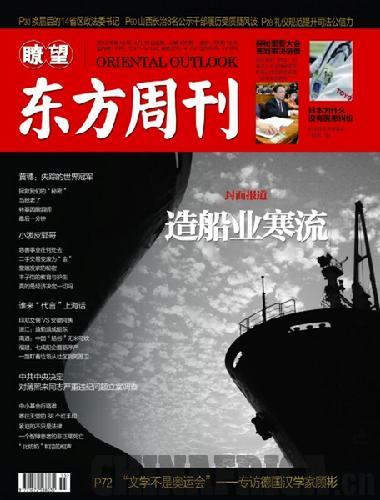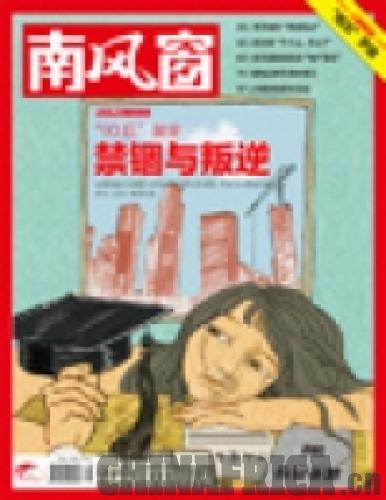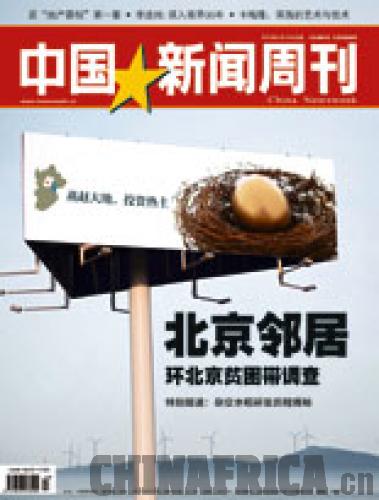| 
SHIPBUILDING CHALLENGES
Oriental Outlook
April 19, 2012
To many industries, the economic turmoil in 2008 was not just a tragic event, but a source of constant trouble in subsequent years. China's shipbuilding industry is one such industry.
After hitting its peak of prosperity in 2008 just before the economic crisis, the industry witnessed its worst downturn since 1986. Orders received by shipbuilding companies in China decreased by 51.9 percent year on year in 2011. About 30 percent of enterprises received no orders at all last year.
Oriental Outlook views the current situation of this industry in China and the problems the enterprises are facing, taking Zhejiang Province, Nantong in Jiangsu Province, and Fujian Province as examples.
Bleak global situation in the industry, lack of financing and low-end manufacturing led to the current downturn, the magazine said. Some heads of shipbuilding enterprises maintain that the industry should be market-oriented with government creating a fair environment for competition in the future. But they also hope the government can provide guidance with financial policies.

GETTING EMPLOYED
Nanfeng Chuang
April 11, 2012
In this summer, China will usher in a new wave of university graduates, with 6.8 million graduates hunting for jobs. When they are free to choose for the first time in the life, they are more inclined to work in government departments and state-owned enterprises.
Nanfeng Chuang looks at this phenomenon and analyzes reasons for the difficulty in university students' employment. Yang Weiguo, Deputy Director of China Institute for Employment Research, maintained reasons rooted in China's higher education system, which cultivated too many university students who were not suited to the demands of China's current economic structure. He believes that with private sectors motivated and prosperous, the society could absorb more job candidates.
FACTORIES TO BLAME
Beijing News
April 17, 2012
Recently, factories have been accused of making empty gelatin capsules containing excessive chromium. The State Food and Drug Administration issued an urgent notice to suspend sales. Only one company involved in the scandal has responded publicly, and no punishment has yet been imposed.
Use of industrial gelatin made from leather scraps is cited as one factor contributing to the problem.
Pharmaceutical factories should take the main responsibility as they are on the first line of defense for drug safety. If they ignore the public's health for commercial gain, they should be severely punished by the law.

SO CLOSE, YET SO FAR
China Newsweek
April 16, 2012
Overlooking at Beijing at night, the capital looks like a stage scattering splendors. In contrast, the lights are enclosed by a dark belt. The belt is made up of 14 counties in Hebei Province that surround Beijing but lag far behind the capital in infrastructure and income.
The magazine looks at reasons for the disparity and ways to eliminate poverty. Natural and man-made obstacles restricted the prosperity of these counties. Poor natural conditions including mountainous terrain, barren land and frequent drought are on the list. As Beijing's reservoirs are located in these counties, many of them must sacrifice their development to protect the environment and ensure the capital's water supply. However, despite extracting a large amount of resources from neighboring counties, the capital does not provide sufficient economic stimulus and fiscal support in return.
EXAM TO BE REFORMED
Guangming Daily
April 16, 2012
According to a report by China Youth and Children Studies Center comparing Chinese high school students with their counterparts in South Korea, Japan and the United States, Chinese students spent most of their after-class time on tutorial classes, while Japanese on arts activities, South Koreans in being volunteers, and Americans on part-time jobs.
Current college entrance examination system as well as singular evaluation mechanism and enrollment standard resulted in overemphasis on students' academic scores and brought a lot of burdens at the same time. Thus, they had no time and energy to get involved in extracurricular activities.
To fundamentally alleviate students' burdens, the university should reform enrollment standards and consider student qualities besides academic records. |